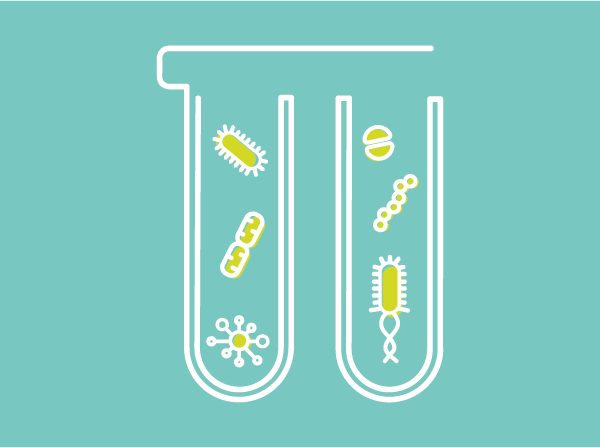OpenBiome presented data on donor efficacy factors and pediatric access at DDW
Press Release
Share
The nonprofit stool bank shared data from a 1,413 patient cohort of fecal transplant recipients and research from 14 abstracts at Digestive Disease Week.
SOMERVILLE, Mass — OpenBiome, a public stool bank, presented new research on fecal microbiota transplantation (FMT) at the 2017 Digestive Disease Week (DDW) meeting in Chicago. Among the five abstracts accepted were studies on whether specific bacteria in FMT drive clinical cure of recurrent Clostridium difficile infection (CDI), the effects of stool donor diet on clinical outcomes, stool processing time and FMT quality, and pediatric access to FMT. OpenBiome also coauthored an additional 9 abstracts presented at the meeting.
One of OpenBiome’s studies won a DDW award for an outstanding poster. Shrish Budree, MD, Clinical Research Fellow at OpenBiome, and Pratik Panchal, MD, MPH, won recognition for “Pediatric Access to Fecal Microbiota Transplantation for Recurrent Clostridium difficile Infection in the United States and the Impact of Stool Banks: A Geospatial Analysis.” According to this study by Budree et al., pediatric Clostridium difficile patients have much less access to FMT than the adult population. Budree and his colleagues found that 72.4% of the U.S. population lives within a 4-hour drive of a pediatric FMT provider, and just 49.4% of the population lives within a 2- hour drive of a pediatric FMT provider. By contrast, previous research has shown that 99.7% of adult patients live within a 4-hour drive of an FMT facility, and 96.7% have an FMT provider within a 2-hour drive.
Dr. Budree also presented findings on several factors that theoretically could affect donor stool FMT efficacy for recurrent CDI: donor metabolomics, diet, stool consistency, and laboratory processing time. Budree and his team collected complete clinical, microbial and metabolomics data for fecal material from 59 donors whose material was used across 1,413 patients with CDI (mean clinical cure rate 84.9%).
Budree et al.’s study of stool pathology and donor nutrition (long-term intake of fiber, fat, calories, and carbohydrates) found that these factors did not significantly change patient outcomes. Another Budree et al. study showed that for stool with a Bristol Stool Scale score of 3-5, donor stool consistency is not associated with clinical cure rates among patients treated with FMT for CDI. Budree et al. found no statistically significant factors driving differences in observed patient outcomes in these studies. These findings suggest that other variables such as patient-specific factors may be causing differences in cure rates for FMT in recurrent CDI.
A final abstract by Budree et al. showed no difference in microbial abundance in stool processed within 30 min or 180 minutes after passage, suggesting that longer stool processing times do not promote pathological microbial bloom, and would not affect FMT effectiveness for CDI.
DDW was held May 5-7 in Chicago, IL. More information about OpenBiome, including its mission, patient stories, and Quality & Safety Assurance program, is available at www.openbiome.org.
Full list of OpenBiome and OpenBiome affiliate posters, DDW 2017
-
Do specific bacteria drive clinical cure in fecal microbiota transplantation for Clostridium difficile infection? Clinical, microbial and metabolomic characterization of universal FMT donors (Budree et al.)[view]
-
The association of donor stool consistency by Bristol stool scale on microbial profile and clinical outcomes of fecal microbiota transplantation in Clostridium difficile infection (Budree et al.)[view]
-
The association of stool donor diet on microbial profile and clinical outcomes of fecal microbiota transplantation in clostridium difficile infection (Budree et al.) [view]
-
Donor stool processing time: the effect on the intestinal microbiome and clinical outcomes of fecal microbiota transplantation in Clostridium difficile Infection Budree et al.)[view]
-
Pediatric access to fecal microbiota transplantation for recurrent Clostridium difficile Infection in the United States and the impact of stool banks: a geospatial analysis (Panchal et al.)[view]
-
Fecal microbiota transplant using a precision medicine approach is safe, associated with lower hospitalization risk and improved cognitive function in recurrent hepatic encephalopathy. (Bajaj et al.) [view]
-
Prevalence of early antibiotic use post-fecal microbiota transplantation and corresponding risk of FMT failure. (Allegretti et al.)[view]
-
Does Rifaximin prior to fecal microbiota transplantation improve clinical outcomes compared to microbiome restoration alone in ulcerative colitis? A cohort study evaluating the impact of non-absorbable antibiotic pretreatment. (El-Nachef et al.) [view]
-
Fecal microbiota transplantation is safe and effective in chronic pouchitis patients (El-Nachef et al.) [view]
-
The role of fecal microbiota transplantation in ulcerative colitis and Crohn’s disease: results from a parallel inflammatory bowel disease cohort study (El-Nachef et al.) [view]
-
Does fecal microbiota transplantation from an obese donor lead to weight gain? A case series of 70 recipients (Fischer et al.) [view]
-
Fecal microbiota transplantation is safe and effective for the treatment of Clostridium difficile infection in solid organ transplant recipients (Fischer et al.) [view]
-
Should we recommend anti-Clostridium difficile antibiotic or probiotic prophylaxis? Risk of Clostridium difficile infection with systemic antimicrobial therapy following successful fecal microbiota transplant. (Fischer et al.) [view]
-
Fecal microbiota transplantation differentially influences the gut microbiota of Clostridium difficile infection and ileal pouch anal anastomosis patients. (Piceno et al.) [view]
